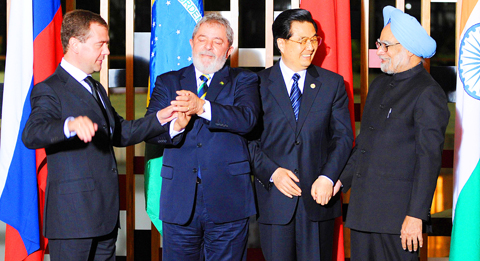Leading emerging powers on Thursday called for swift reform of international financial institutions to give developing countries a greater voice, saying their group was vital to achieving a new world order.
The call from the increasingly influential BRIC countries — Brazil, Russia, India and China — for more say in global financial institutions such as the World Bank and the IMF came ahead of this month’s G20 finance ministers’ and IMF meetings in Washington.

PHOTO: AFP
MORE CLOUT
The leaders of the four countries said that voting share reforms at the World Bank to give developing countries more clout should be approved at the IMF meetings.
Setting a specific deadline, the group also said those reforms should be completed by a G20 summit in November.
“Brazil, Russia, India and China have a fundamental role in creating a new international order that is more just, representative and safe,” Brazilian President Luiz Inacio Lula da Silva said after holding talks with his counterparts.
The group has been pushing for reforms since the global financial crisis of 2008, arguing the current system is unfairly dominated by advanced economies such as the US, Japan and Europe.
The statement said the group would resist all trade protectionism and look into increasing commerce with one another in local currencies, bypassing the US dollar.
However, the group, which has rowed back from talk last year of setting up a new reserve currency, stressed the importance of maintaining the stability of major reserve currencies.
As the largest holder of US Treasury bonds, China is not keen to see the value of its investments diminish.
The BRIC summit, held in Brasilia, was scaled back when Chinese President Hu Jintao (胡錦濤) decided to go home early to deal with a major earthquake in a remote western region of China.
In one of their few concrete steps toward cooperation, the countries’ national development banks signed an accord enabling them to fund projects in one another’s countries, Brazil’s National Development Bank president Luciano Coutinho said, adding that the agreement covered the infrastructure, energy, sustainability and technology sectors.
China and Brazil, the largest economies in Asia and Latin America, used the summit to bolster growing ties with trade and investment agreements.
‘ACTION PLAN’
Hu and Lula signed a five-year “action plan” aimed at boosting trade and energy cooperation. The two nations have grown closer in recent years amid a surge in commerce — last year, China became Brazil’s top trade partner.
The projects agreed upon included a US$5 billion steel mill at the Acu port in Rio de Janeiro state that would be China’s biggest investment in Latin America’s largest country, home to some of the world’s largest iron ore deposits.
China’s Wuhan Iron and Steel (武鋼) and Brazilian logistics firm LLX Logistica, controlled by billionaire Eike Batista, will build the plant.
China’s Sinopec (中石化) and the country’s development bank signed a strategic development agreement with Brazil’s state-run oil giant Petrobras, Sinopec chairman Su Shulin (蘇樹林) said.
Su said the deal would cover the development of Brazilian oil resources and trade with China.

WAITING GAME: The US has so far only offered a ‘best rate tariff,’ which officials assume is about 15 percent, the same as Japan, a person familiar with the matter said Taiwan and the US have completed “technical consultations” regarding tariffs and a finalized rate is expected to be released soon, Executive Yuan spokeswoman Michelle Lee (李慧芝) told a news conference yesterday, as a 90-day pause on US President Donald Trump’s “reciprocal” tariffs is set to expire today. The two countries have reached a “certain degree of consensus” on issues such as tariffs, nontariff trade barriers, trade facilitation, supply chain resilience and economic security, Lee said. They also discussed opportunities for cooperation, investment and procurement, she said. A joint statement is still being negotiated and would be released once the US government has made

Authorities have detained three former Taiwan Semiconductor Manufacturing Co (TMSC, 台積電) employees on suspicion of compromising classified technology used in making 2-nanometer chips, the Taiwan High Prosecutors’ Office said yesterday. Prosecutors are holding a former TSMC engineer surnamed Chen (陳) and two recently sacked TSMC engineers, including one person surnamed Wu (吳) in detention with restricted communication, following an investigation launched on July 25, a statement said. The announcement came a day after Nikkei Asia reported on the technology theft in an exclusive story, saying TSMC had fired two workers for contravening data rules on advanced chipmaking technology. Two-nanometer wafers are the most

NEW GEAR: On top of the new Tien Kung IV air defense missiles, the military is expected to place orders for a new combat vehicle next year for delivery in 2028 Mass production of Tien Kung IV (Sky Bow IV) missiles is expected to start next year, with plans to order 122 pods, the Ministry of National Defense’s (MND) latest list of regulated military material showed. The document said that the armed forces would obtain 46 pods of the air defense missiles next year and 76 pods the year after that. The Tien Kung IV is designed to intercept cruise missiles and ballistic missiles to an altitude of 70km, compared with the 60km maximum altitude achieved by the Missile Segment Enhancement variant of PAC-3 systems. A defense source said yesterday that the number of

Taiwanese exports to the US are to be subject to a 20 percent tariff starting on Thursday next week, according to an executive order signed by US President Donald Trump yesterday. The 20 percent levy was the same as the tariffs imposed on Vietnam, Sri Lanka and Bangladesh by Trump. It was higher than the tariffs imposed on Japan, South Korea and the EU (15 percent), as well as those on the Philippines (19 percent). A Taiwan official with knowledge of the matter said it is a "phased" tariff rate, and negotiations would continue. "Once negotiations conclude, Taiwan will obtain a better